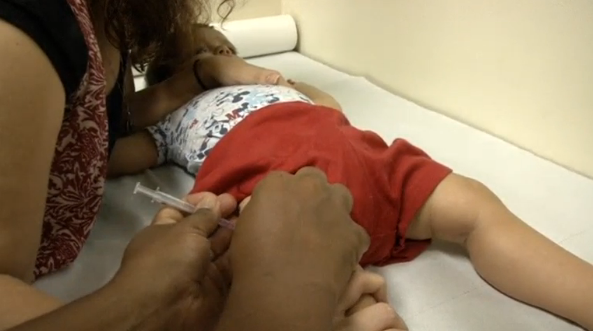
SAO PAULO, Brazil (Reuters) – Further to the outbreak of the Zika virus, Brazil is battling an increase in cases of flu with anticipated vaccination services, despite sweeping budget cuts for health.
State health authorities in Sao Paulo initiated their annual vaccination services early this year to protect some 3.5 million people who are most at risk.
An extra round of vaccinations began on March 23, ahead of the start of planned services mid-April. The main target group for early vaccinations are young children, who will receive vaccinations against H1N1 virus.
Infectologist, Roberto Florin, is among 532,400 health professionals to have received the vaccination kits throughout public and private hospitals in Sao Paulo state.
“The vaccines were planned for April, probably from the 10th, the second fortnight of April. As the circulation of the virus has been high and the number of vaccines is still scarce, demand has been high and has created a situation of panic of people wanting information regarding H1N1,” said Florin.
Until March 22 this year, 324 cases of Severe Acute Respiratory Syndrome resulting from flu were confirmed throughout the state of Sao Paulo, compared to 243 cases between January and August 2015, according to Secretary of Health figures. State health authorities stipulate that cases of the syndrome must be obligatorily reported.
Parents in Sao Paulo worry about the spread of the virus between children at school.
“He is very scared about getting ill, and the fact they have been talking so much in the media makes us mothers worried too, especially as (children) are much more sensitive to picking up illnesses. He is at school full-time and children pass on illnesses from one to the other, he always has a cold, so I am very scared about him getting a bad flu,” said mother, Juliana Macedo.
“A lot of people are talking about how the flu came earlier this year and (children) are at risk. We don’t want anything to happen, so we rushed to try to find a vaccination centre and to sign up,” added father, Antonio Pinto.
Added concerns regarding flu and the Zika virus come as Brazil’s beleaguered government attempts to reign in public spending, with the health ministry budget being cut from 90.35 to 87.98 billion reales (25.19 to 24.52 billion U.S. dollars) this year.
The vaccine is expected to be administered to 982,800 children between the ages of six months and five years, 179,900 pregnant women and 1,83 million elderly patients throughout the state capital and great Sao Paulo.
In other cities throughout the state, other target groups include the chronically ill, breast-feeding women, indigenous communities and inmates.







